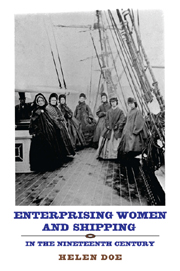Book contents
- Frontmatter
- Contents
- List of Tables and Figures
- List of Illustrations
- Dedication
- Acknowledgements
- Abbreviations
- Introduction
- 1 The Legal, Financial and Cultural Environment
- 2 Maritime Communities
- 3 Five Investor Ports
- 4 Shipowning Wives, Widows and Spinsters
- 5 Active and Passive Female Shipowners
- 6 Managing Owners
- 7 Port Businesswomen
- 8 Warship Builders
- 9 Merchant Shipbuilders
- 10 Conclusion: ‘A Respectable and Desirable Thing’
- Appendices
9 - Merchant Shipbuilders
Published online by Cambridge University Press: 12 September 2012
- Frontmatter
- Contents
- List of Tables and Figures
- List of Illustrations
- Dedication
- Acknowledgements
- Abbreviations
- Introduction
- 1 The Legal, Financial and Cultural Environment
- 2 Maritime Communities
- 3 Five Investor Ports
- 4 Shipowning Wives, Widows and Spinsters
- 5 Active and Passive Female Shipowners
- 6 Managing Owners
- 7 Port Businesswomen
- 8 Warship Builders
- 9 Merchant Shipbuilders
- 10 Conclusion: ‘A Respectable and Desirable Thing’
- Appendices
Summary
The two warship builders, Mrs Barnard and Mrs Ross, were not wartime aberrations. Women had been managing shipyards for many years and continued to do so throughout the nineteenth century, albeit only in wooden shipbuilding. Building for the navy had its own challenges and wartime conditions brought problems of timber and labour supplies. However, building for merchants and shipowners was not without its problems and many of the same types of challenges had to be faced. Researching government suppliers is helped by the records that were kept, but this is not the case in the commercial world where few business accounts survive. The information on the merchant shipbuilders has therefore come from a wide variety of sources, from wills and ship registers to trade directories and government statistics. In this chapter the work of the merchant shipbuilder will be discussed and the challenges that men and women faced in running the business. Each woman had different circumstances to contend with both personally and professionally and so these are shown in a series of case studies.
The Women's ‘Art and Business’ of Shipbuilding
Cyprian May, shipbuilder of Plymouth, wrote his will in 1785 two years before his death. He left all of his ‘yard buildings and fixtures’ and half of his ‘tool stock and materials relating and belonging to the art and business of a shipwright’, not to his sons, but to his wife, Elizabeth.
- Type
- Chapter
- Information
- Enterprising Women and Shipping in the Nineteenth Century , pp. 193 - 215Publisher: Boydell & BrewerPrint publication year: 2009



